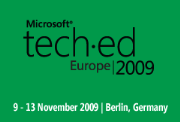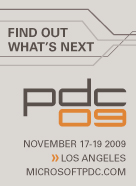After nearly 2 years of not being able to tell anyone what I was working on – or even the name of the team I was on! – //build is finally here and the Windows 8 developer preview is finally out there in the open for everyone to start building applications for. You have NO idea how hard it’s been for me to keep my mouth shut and blog quiet about this!
I am a program manager on the Runtime Experience team, one of many teams in the Windows division building Windows 8. Our team is responsible for building the underlying infrastructure that powers the Windows Runtime (or WinRT for short). In particular, I work on the WinRT metadata infrastructure. I also work closely with our partners in Developer Division that use the metadata to project WinRT APIs into multiple languages.
In a nutshell, WinRT is the new API surface area for Metro style apps in Windows 8. WinRT APIs are available across multiple languages – C#, Visual Basic, C++ and JavaScript – enabling developers to build Metro style apps using the language and frameworks they are most familiar with. Much, much more info is available on the new Windows Dev Center.
In addition to the developer preview docs for WinRT, there are several sessions at //build focusing on WinRT – what it is, how it works under the covers, and how you use it from the various languages. Here’s a handy list of all the //build sessions you should check out if you want to know more about WinRT:
- Lap Around Windows
Runtime
Martyn Lovell – the dev manager for the Runtime Experience team – provides a overview of the Windows Runtime. - Using the Windows Runtime from C# and Visual
Basic
Jesse Kaplan from the CLR team and I cover how you can build managed Metro style apps and how you use WinRT from C# and VB. Obviously, I highly recommend this session because…Well, it’s my session isn’t it? What am I gonna say? Don’t watch my talk? - Using the Windows Runtime from
JavaScript
Luke Hoban from the JavaScript team talks about how WinRT is used when building the new Metro style apps in HTML5 and JavaScript. - Using the Windows Runtime from
C++
Herb Sutter from the C++ team as well as the C++ standards committee talks about how WinRT is used for C++ developers building native Metro style apps. - Async Everywhere: creating responsive APIs and
apps
Ben Kuhn, a developer on the Runtime Experience team, dives deep on how async is exposed and implemented in WinRT - Windows Runtime Internals: understanding “Hello
World”
Matt Merry, a teammate on the Runtime Experience PM team, goes under the hood and shows you how the internals of WinRT work. - Being Pragmatic by leveraging existing code in Metro style
apps
Jason Olson, a teammate on the Runtime Experience PM team and my next door office neighbor, talks about how you bring your existing code into the new world of Metro style apps. In particular, he’s got a wicked cool demo. - Windows Interns: our summer of
apps
John Lam, my immediate boss, is MCing this session with some of the Windows Interns who built the first Windows 8 Metro style apps over the summer.
As I write this, not all the sessions have been delivered and none of them are available online yet. But they should all be online within a couple of days. Also, you can also get more information as well as ask questions over at the Windows Dev Center Forums. Our dev manager has already been very busy answering questions!
I am so excited that you can finally see what we’ve been working on and I can wait to see what you build with Windows 8!




